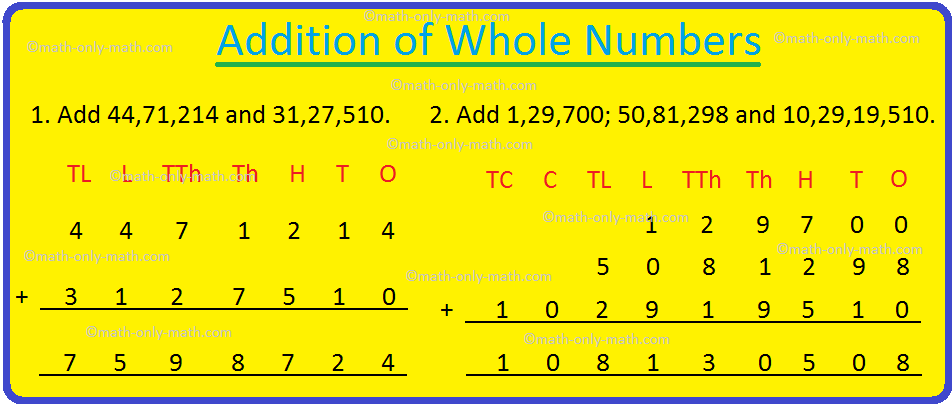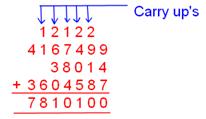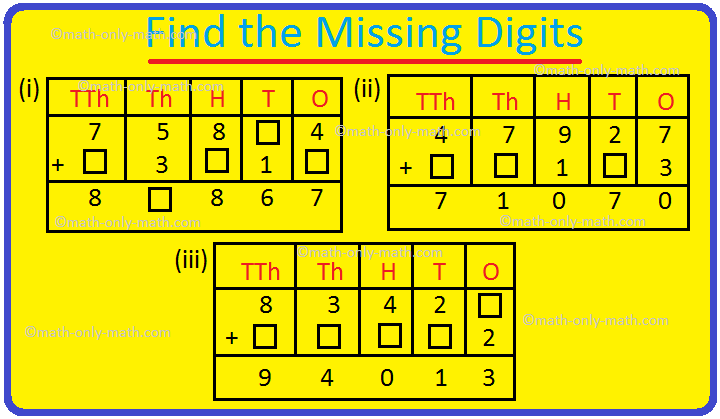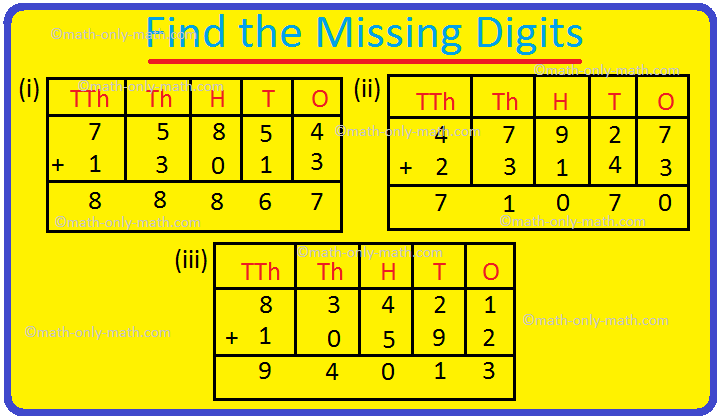Subscribe to our ▶️ YouTube channel 🔴 for the latest videos, updates, and tips.
Addition of Whole Numbers
Addition of whole numbers is discussed in the following steps how to add large numbers:
Step I:
We arrange the given numbers in columns, ones under ones, tens under tens, hundred under hundreds and so on.
Step II:
We add the digits in each column taking the carry over, if any, to the next column the left, and adding it along with the digit in that column. We continue this process till we add the digits in all the columns.
We have already learnt how to add the numbers up to 6 digits. Larger numbers are also added as usual. We arrange the numbers properly and then add them.
Solved Examples on Addition of Whole Numbers:
1. Add 3507469 and 6641007.
Solution:
We arrange the given numbers in column and add as follows:
Step I: Add ones place i.e. 9 + 7 = 16 which is equal to 1 ten + 6 ones
Step II: Carry 1 ten to the tens column as shown.
Step III: Add tens place i.e. 6 tens + 0 tens + 1 ten which is equal to 7 tens.
Step IV: Add hundreds place i.e. 4 hundreds + 0 hundred which is equal to 4 hundreds.
Step V: Add thousands place i.e. 7 thousands + 1 thousand which is equal to 8 thousands.
Step VI: Add ten thousands place i.e. 0 ten thousand + 4 ten thousands which is equal to 4 ten thousands.
Step VII: Add hundred thousands place i.e. 5 hundred thousands + 6 hundred thousands which is equal to 1 million + 1 hundred thousand.
Step VIII: Carry 1 million to the millions column as shown.
Step IX: Add millions place i.e. 3 millions + 6 millions + 1 million which is equal to 10 millions.
Therefore, the sum of given numbers= 10148476.
2. Add 4167499; 38014 and 3604587.
Solution:
We arrange the given numbers in column and add as follows:
Step I: Add ones place i.e. 9 + 4 + 7 = 20 which is equal to 2 tens + 0 ones
Step II: Carry 2 tens to the tens column as shown.
Step III: Add tens place i.e. 9 tens + 1 ten + 8 tens + 2 tens which is equal to 2 hundreds + 0 tens.
Step IV: Carry 2 hundreds to the hundreds column as shown.
Step V: Add hundreds place i.e. 4 hundreds + 0 hundreds + 5 hundreds + 2 hundreds which is equal to 1 thousand + 1 hundred.
Step VI: Carry 1 thousand to the thousands column as shown.
Step VII: Add thousands place i.e. 7 thousands + 8 thousands + 4 thousands + 1 thousand which is equal to 2 ten thousands + 0 thousand.
Step VIII: Carry 2 ten thousands to the ten thousands column as shown.
Step IX: Add ten thousands place i.e. 6 ten thousands + 3 ten thousands + 0 ten thousand + 2 ten thousands which is equal to 1 hundred thousand + 1 ten thousand.
Step X: Carry 1 hundred thousand to the hundred thousands column as shown.
Step XI: Add hundred thousands place i.e. 1 hundred thousand + 6 hundred thousands + 1 hundred thousand which is equal to 8 hundred thousands.
Step XII: Add millions i.e. 4 millions + 3 millions which is equal to 7 millions.
Therefore, the sum of given numbers= 7810100.
Note: We can add 7-digit, 8-digit and 9-digit numbers in the same way as we added 5-digit and 6-digit numbers. While arranging the addends in columns we need to be careful.
Addition of numbers with more than five digits can be done in the same way as we discussed in the above examples.
We arrange the numbers one below the other in the place value columns. We start adding them one by one from the right most column and take the carry over to the next column, if required.
3. Add 44,71,214 and 31,27,510.
Solution:
TL L TTh Th H T O
4 4 7 1 2 1 4
+ 3 1 2 7 5 1 0
7 5 9 8 7 2 4
Hence 44,71,214 + 31,27,510 = 75,98,724
4. Add 1,29,700; 50,81,298 and 10,29,19,510.
Solution:
TC C TL L TTh Th H T O
1 2 9 7 0 0
5 0 8 1 2 9 8
+ 1 0 2 9 1 9 5 1 0
1 0 8 1 3 0 5 0 8
Hence 1,29,700 + 50,81,298 + 10,29,19,510 = 10,81,30,508.
5. Add 46,39,20,321; 20,24,32,034 and 14,21,39,209
Solution:
The given numbers are in the Indian system, so we place comma, in the sum according to the Indian system.
4 6 3 9 2 0 3 2 1
2 0 2 4 3 2 0 3 4
+ 1 4 2 1 3 9 2 0 9
8 0 8 4 9 1 5 6 4
Therefore, the answer is 80,84,91,564.
6. Add 181,416,189; 29,652,018 and 509,737,098
Solution:
The given numbers are in the International system, so we place comma, in the sum according to the International system.
1 8 1 4 1 6 1 8 9
2 9 6 5 2 0 1 8
+ 5 0 9 7 3 7 0 9 8
7 2 0 8 0 5 3 0 5
So, the answer is 720,805,305
Word Problems on Addition of Whole Numbers:
1. The number of people visiting the World Science Fair on first three days of the week were 1,65,892; 1,63,844 and 1,88,514. What is the total number of people visiting the fair in these three days?
Solution:
Number of people visiting on the first day = 1,65,892
Number of people visiting on the second day = 1,63,844
Number of people visiting on the third day = 1,88,514
L TTh Th H T O
1 6 5 8 9 2
1 6 3 8 4 4
+ 1 8 8 5 1 4
5 1 8 2 5 0
Hence the total number of people visited = 5,18,250
2. A garment factory manufactured 49362534 garments in the month of January and 38351524 garments in the month of February and 40332436 garments in the month of March. How many garments were manufactured in the three months?
Solution:
Number of garments manufactured in January = 49362534
Number of garments manufactured in February = 38351524
Number of garments manufactured in March = 40332436
Total number of garments manufactured
= 49362534 + 38351524 + 40332436
= 128046494
Thus, the total 128046494 garments were manufactured in three months.
Problems on Addition of Whole Numbers:
Worksheet on Addition of Whole Numbers
1. Write in columns and add the given numbers.
(i) 65,772 + 47,994
(ii) 89,00,307 + 90,65,070
(iii) 1,72,338 + 3,65,419
(iv) 77,08,334 + 6,92,456 + 28,65,008
(v) 2,34,04,673 + 86,65,708
(vi) 45,19,206 + 1,62,318 + 10,00,170
Answer:
(i) 1,13,766
(ii) 1,79,65,377
(iii) 5,37,757
(iv) 1,12,65,798
(v) 3,20,70,381
(vi) 56,81,694
2. Find the missing digits in the following sums.
Answer:
Solve the given Word Problems on Addition of Whole Numbers:
1. David's dream is to live in his own house. He buys a plot of land for $13,88,52,000 and spends $1,89,00,00 to build a house. What is the total amount of money spent by David to fulfill his dream?
Answer: 14,07,42,000
2. According to a census, there were 2,86,45,785 females in a country. The number of males is 6,44,991 more. What is the total population of the country?
Answer: 5,79,36,561
3. 12,66,400 people came to visit the Book Fair in the first week and 15,22,600 people came in the second week. How many total number of people visited the fair in the two weeks.
Answer: 27,89,000
4. Nancy and her brother Clark are playing video games. Nancy scored 7,225,600 points and Clark scored 59,99,000 points. What is the combined score of Nancy and Clark?
Answer: 1,32,24,600
- Addition Of Whole Numbers.
- Subtraction Of Whole Numbers.
- Multiplication Of Whole Numbers.
- Properties Of Multiplication.
- Division Of Whole Numbers.
- Properties Of Division.
Didn't find what you were looking for? Or want to know more information about Math Only Math. Use this Google Search to find what you need.







New! Comments
Have your say about what you just read! Leave me a comment in the box below. Ask a Question or Answer a Question.